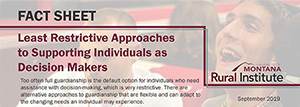The Rural Institute Publishes Fact Sheet: The Least Restrictive Approaches to Supporting Individuals as Decision Makers (MT UCEDD)
November 18, 2019

|
The Rural Institute for Inclusive Communities is pleased to share a fact sheet on alternative approaches to guardianship.
The Rural Institute has worked on issues surrounding guardianship for many years. In the late 2000s, Rural Institute staff members Marsha Katz and Ellen Condon, and Theresa Baldry, who was working for PLUK (Parents, Let's Unite for Kids) at the time, collaborated with various community partners and created tools and resources focused on alternatives to guardianship.
Ms. Baldry, who now works at the Rural Institute as a Project Coordinator for Transition and Employment Projects and the Montana Deaf-Blind project, stated:
My work exploring options besides guardianship started because we needed a plan that matched with our son, Isaac. We had spent time increasing his self-advocacy and life skills, and then were told we needed a guardianship for him. Guardianship didn't fit with our vision of his future, and it certainly wouldn't help Isaac be the independent adult we had been preparing him to be.
To address the need for more information about less-restrictive alternatives to guardianship, Ms. Baldry and Rural Institute staff members Kim Brown and Lauren Smith created a fact sheet to further the momentum building in Montana and nationally to support people's individual rights. Often full guardianship, which is very restrictive, is the default option for individuals who need assistance with decision-making. There are alternative approaches to guardianship that can adapt to an individual's changing needs.
The Rural Institute fact sheet defines guardianship, shares some alternative approaches to guardianship, addresses myths about decision-making supports, and provides links to guardianship and decision-making resources for further information.
The fact sheet has been shared with The National Center on Deaf-Blindness, Disability Rights Montana, Vocational Rehabilitation offices, and parent, transition and medical partners and stakeholders.
"For me, considering alternatives to guardianship is about respecting the individual rights of each person," said Ms. Baldry. "If we value all people, we empower them to value themselves."
Please click on the following link to view, download, and share the fact sheet:
Least Restrictive Approaches to Supporting Individuals as Decision Makers







